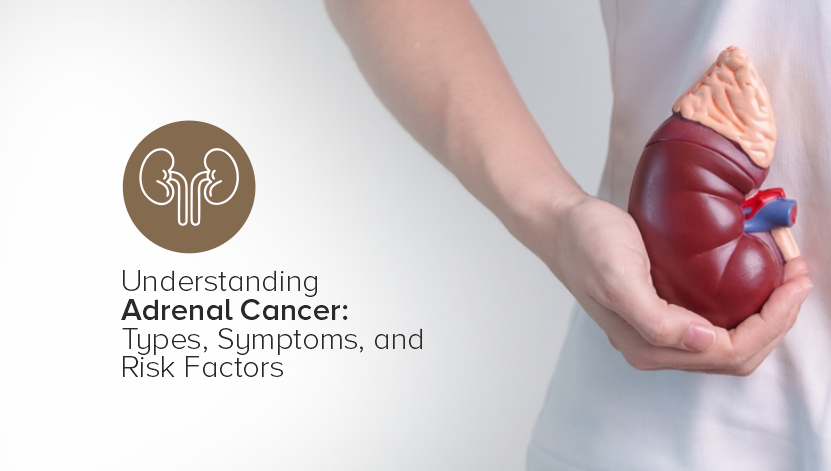The adrenal glands, the pair of small organs located on top of each kidney, play a vital role in the functioning of our bodies. Among the many essential things they do, one of their major responsibilities is hormone production, which helps regulate metabolism, immune system, blood sugar levels, and response to stress. These tiny powerhouses are usually the unsung heroes, quietly doing their jobs until something goes wrong. And when it does, it may be adrenal cancer that’s disrupting the natural order.
With the very mention of the word 'cancer', fear and concern come to the fore. Adrenal cancer, a relatively rare form of cancer, can be particularly troubling, owing to its location near important vital organs and its potential to affect hormone levels.

Adrenal cancer, also known as adrenocortical carcinoma, begins in the adrenals' cortex — the outer layer that produces vital hormones. There are two types of adrenal cancer:
This is cancer that starts in the adrenal cortex. While it's a rare cancer, it is also one of the most common lines of cancer that spread to other parts of the body, a state called metastasis.
This type of adrenal tumor develops in the adrenal medulla and usually doesn’t affect hormone production, unlike adrenocortical carcinoma. It's a rare condition, with only a few hundred cases diagnosed each year. Hernias and other lower abdominal growths can cause similar symptoms but are not pheochromocytomas.
Each type of cancer requires a different treatment approach and carries varying prognoses. Treatment generally involves surgical removal of the affected adrenal gland, sometimes combined with other therapies depending on the stage and type of cancer.
Adrenal cancer is often challenging to detect because its symptoms can be mistaken for those of other conditions. However, there are several common signs to watch for, including:
Adrenocortical carcinomas may be associated with an excess production of certain hormones such as cortisol, which can lead to rapid weight gain and fluid retention.
If the tumor affects hormone production, hormonal imbalances may appear. These imbalances can cause a variety of symptoms, including high blood pressure, diabetes, excessive body hair, and menstrual irregularities in women.
This is one of the more general symptoms and can indicate a variety of illnesses or conditions. In the case of adrenal cancer or pheochromocytoma, it typically occurs on the side of the body where the affected adrenal gland is located.
If you experience these symptoms, it doesn’t necessarily mean you have adrenal cancer, but it’s important to consult with a healthcare professional to ensure proper diagnosis and treatment.
The precise causes of adrenal cancer remain uncertain, but several risk factors have been identified that could increase the likelihood of developing the disease.
Adrenal cancer can occur at any age, but it's most common in children younger than five and adults in their 40s and 50s. It affects both genders, but some types, such as pheochromocytoma, are slightly more prevalent in women while adrenocortical carcinoma is more common in women.
Certain genetic syndromes, such as familial adenomatous polyposis and Lynch syndrome, are associated with an increased risk of various cancers, including adrenal cancer.
People who have undergone radiation therapy might have a higher risk of developing adrenal cancer, particularly adrenocortical carcinoma.
Understanding these factors is not meant to induce panic but to highlight the importance of regular health checkups and early detection for the best possible outcomes.
Early diagnosis of adrenal cancer is crucial for a positive prognosis. Diagnostic procedures for adrenal cancer may include:
These can include CT scans, MRI, and PET scans to create detailed pictures of the inside of the body and locate any tumors.
Laboratory tests can measure hormone levels in the body to detect any imbalances that could be attributed to tumors in the adrenal glands.
A tissue sample of the tumor is removed and examined under a microscope to determine if it's cancerous.
If diagnosed with adrenal cancer, the treatment plan will depend on the stage of the cancer, your overall health, and your preferences. Treatment options include surgery, radiation therapy, and chemotherapy. Some patients may be eligible for clinical trials of newer treatments.
Prognosis for adrenal cancer can vary, depending on various factors such as the patient's health, the stage of the cancer at diagnosis, and the type of cancer. The presence of metastases dramatically changes the treatment plan and prognosis. In general, patients diagnosed with early-stage adrenal cancer can expect a better outcome than those diagnosed at an advanced stage.
Patients living with adrenal cancer or those in remission can face a range of challenges, including ongoing treatment, managing side effects, and emotional well-being. It's important to have a strong support system in place, which can include family, friends, and support groups.
There are no foolproof measures to prevent adrenal cancer, but some lifestyle choices can potentially reduce the risk. These include maintaining a healthy weight, avoiding tobacco, and staying physically active. Regular medical checkups and early intervention also play a key role in catching any abnormalities early.
For those with a family history of adrenal cancer, genetic counseling can be beneficial in understanding possible risks and taking proactive measures. It’s important to work with healthcare providers to stay informed and empowered when it comes to your health.
Shedding light on a complex and little-understood condition like adrenal cancer is the first step towards finding effective treatments and, ultimately, a cure. Whether you are a patient, a caregiver, or simply an individual looking to expand their knowledge for the well-being of their health and others', this comprehensive guide aims to provide a foundation for understanding adrenal cancer. For Adrenal Cancer treatment in India, American Oncology Institute is recognized as the top multi-disciplinary oncology hospital known for its expertise and advanced care.